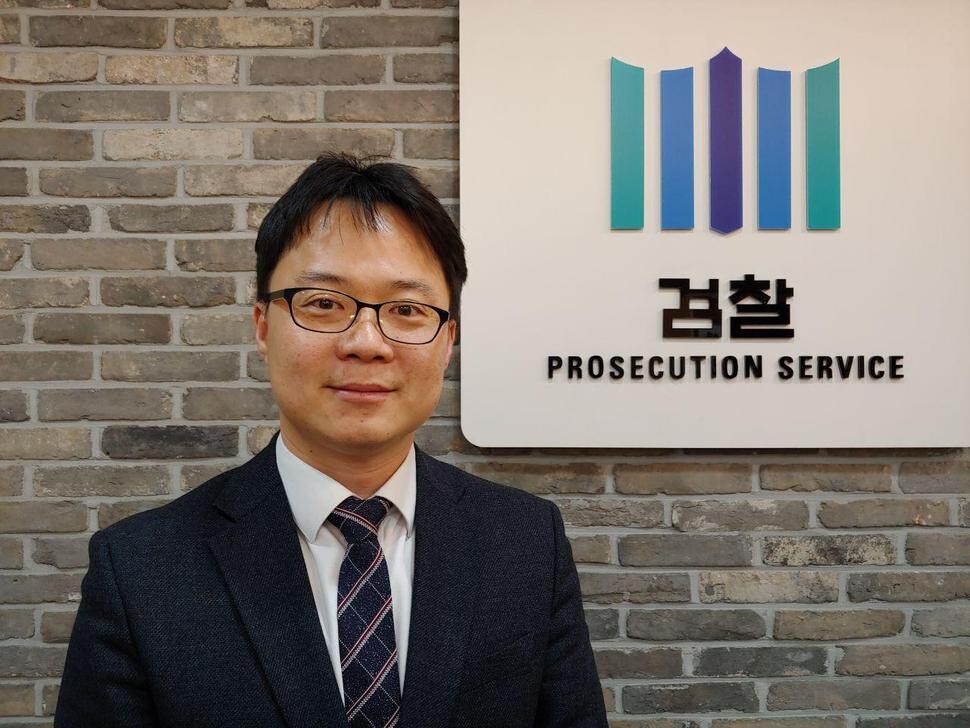hankyoreh
Links to other country sites 다른 나라 사이트 링크
[Interview] Jeju prosecutor works to clear the names of Jeju Uprising prisoners

“I wanted to allow the Jeju April 3 prisoners to receive a trial worthy of the name justice.”
Eighteen former prisoners from the Jeju Uprising of 1948–49 received the equivalent of an acquittal on Jan. 17 when the charges against them were dismissed in a requested retrial by the second criminal division of Jeju District Court under Hon. Judge Jegal Chang. A month earlier on Dec. 17, Jeong Gwang-byeong, 39, a prosecutor with the Jeju District Prosecutors’ Office, had requested that the court issue a ruling dismissing the charges. It was a deviation from the conventional path taken by prosecutors, who have often pursued guilty rulings even in retrials when clear evidence of injustices has surfaced in their investigations.
Meeting with the Hankyoreh after the ruling, Jeong explained that the reason had been to allow a “trial worthy of the name justice.” Jeong had previously handled retrials in connection with the uprising (known locally as “Jeju April 3”) for the past two years alongside Park Geum-bit (36, 41st Judicial Research and Training Institute class) and Lee Sang-hu (32, two-time bar examination candidate).
Jeong hails from the mainland rather than Jeju Island.
“I’m embarrassed to admit that I didn’t really even known about Jeju April 3. I had heard about it as a topic for historical novels, television shows, and movies, but I didn’t have much of an interest,” he explained.
“It was during the trial preparations that I saw the investigation reports and documents and saw how all of these innocent people had been sacrificed in the name of ideology and authority.”
No record of the charges against the defendants
Jeong described the experience as a battle with “amorphous trials.” Over seven decades ago, 2,530 Jeju residents were subjected to illegal detention and torture before being delivered for military courts-martial where proper procedures were ignored – and ultimately being sent to prison. No records of the process remain on the prisoner registers. The court decided to proceed with the retrial anyway, and the prosecutors declined to appeal – deciding that it would not be right to pass responsibility for the absence of records onto the defendants.
Jeong and the other prosecutors had to determine what the exact charges against the prisoners were and whether there was any substance to them. He departed for the mainland on a three-day trip with a prosecution investigator and archive researcher. A search of the Army headquarters, the Seoul branch of the National Archives, and around ten other places turned up no surviving records. The judge advocates involved in the courts-material had already passed away.
“The former prisoners kept saying over and over that they wanted to know what the charges were that required them to be detained and tortured, and why they had to serve time in prison without a proper trial,” Jeong said. “We couldn’t give up just because we couldn’t find the records.”
Accordingly, Jeong and the others decided to proceed with “defendant questioning” for the former prisoners. The job of a prosecutor involves proving guilt to ensure proper punishment – but prosecutors can also clear the names of innocent people as representatives of the public interest.
“These former prisoners had never complained to the state about their unfair treatment, and I wanted to give them a chance to share about their suffering,” Jeong said. One of the stories he heard was 93-year-old Oh Kye-choon’s account of losing her son on the boat while being taken to a mainland prison, and being forced to turn the body over to police.
“I felt like I could never fathom the depth of suffering they experienced at the hands of the authorities,” he said of his reaction.
“I just hope this first court ruling can be of some comfort to people who have had to battle through their tears,” he added, expressing his respect for the court’s determination.
By Ko Han-sol, staff reporter
Please direct comments or questions to [english@hani.co.kr]

Editorial・opinion
![[Column] Park Geun-hye déjà vu in Yoon Suk-yeol [Column] Park Geun-hye déjà vu in Yoon Suk-yeol](https://flexible.img.hani.co.kr/flexible/normal/500/300/imgdb/original/2024/0424/651713945113788.jpg) [Column] Park Geun-hye déjà vu in Yoon Suk-yeol
[Column] Park Geun-hye déjà vu in Yoon Suk-yeol![[Editorial] New weight of N. Korea’s nuclear threats makes dialogue all the more urgent [Editorial] New weight of N. Korea’s nuclear threats makes dialogue all the more urgent](https://flexible.img.hani.co.kr/flexible/normal/500/300/imgdb/original/2024/0424/7317139454662664.jpg) [Editorial] New weight of N. Korea’s nuclear threats makes dialogue all the more urgent
[Editorial] New weight of N. Korea’s nuclear threats makes dialogue all the more urgent- [Guest essay] The real reason Korea’s new right wants to dub Rhee a founding father
- [Column] ‘Choson’: Is it time we start referring to N. Korea in its own terms?
- [Editorial] Japan’s rewriting of history with Korea has gone too far
- [Column] The president’s questionable capacity for dialogue
- [Column] Are chaebol firms just pizza pies for families to divvy up as they please?
- [Column] Has Korea, too, crossed the Rubicon on China?
- [Correspondent’s column] In Japan’s alliance with US, echoes of its past alliances with UK
- [Editorial] Does Yoon think the Korean public is wrong?
Most viewed articles
- 1[Column] Park Geun-hye déjà vu in Yoon Suk-yeol
- 2Thursday to mark start of resignations by senior doctors amid standoff with government
- 3N. Korean hackers breached 10 defense contractors in South for months, police say
- 4[Editorial] New weight of N. Korea’s nuclear threats makes dialogue all the more urgent
- 5Will NewJeans end up collateral damage in internal feud at K-pop juggernaut Hybe?
- 6Kim Jong-un expressed ‘satisfaction’ with nuclear counterstrike drill directed at South
- 7[Editorial] Japan’s rewriting of history with Korea has gone too far
- 8[Column] ‘Choson’: Is it time we start referring to N. Korea in its own terms?
- 9[Cine feature] A new shift in the Korean film investment and distribution market
- 10[Column] The clock is ticking for Korea’s first lady